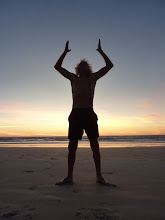Fricke builds a new camera system for each film, working from the Todd 70mm system. His cameras are mounted on high-tech computerized equatorial platforms that can track celestial motions in the same way that telescopes do. His films contain some of the freakiest and longest time-lapse sequences of, for example, an entire night compressed into a minute, showing the stars moving across the sky, clouds whizzing through, then the sun rising on majestic canyons in the America southwest...the coolest time-lapse I've ever seen!
Fricke's concepts all relate directly to his overall philosophy of film-making. 'Chronos' is an ancient Greek word meaning 'time' but was also a deity as well as the planet Saturn. 'Koyaanisqatsi' is a Hopi word meaning 'crazy life' or 'life out of balance' and depicts human industrial civilization with its pedal to the metal; this film, the only one of the Goddfrey Reggio's 'qatsi trilogy' that's got any power, is based on three main Hopi prophecies which are actually sung in Hopi: "If we dig precious things from the land, we will invite disaster...Near the day of purification, cob-webs will be spun back and forth in the sky...a gourd of ash will be thrown from the sky which will burn the land and boil the oceans." 'Baraka' is a Sufi word meaning 'blessing' and has Fricke's characteristic land-scape and time-lapse sequences but also people around the world doing their 'spiritual' things.
'Samsara', his latest film, is a Sanskrit word meaning 'wheel of life' and has to do with 'illusion'. This film I'm sure has all the Fricke trade-mark features, but focuses more on the 'people' side of things.
Ron Fricke says that his basic philosophy of film-making is 'to explore humanity's relationship with the eternal.' In a world gone mad with consumerism and fabricated 'reality' shoved down our throats, these films are a testament to the spirit of true creative vision, philosophical exploration and cosmic insight into what it means to be here now as human beings...a precious gift that very few of us actually appreciate.
DON'T MISS 'SAMSARA'...coming soon to a theatre near you.
The team behind Baraka reunites for another journey around the world in Samsara, exploring themes of birth, life, death and rebirth through stunning visuals and music. 'Samsara' is a Tibetan word that means "the ever turning wheel of life," and the film is an unparalleled sensory experience.
Baraka director Ron Fricke reunites with producer Mark Magidson to expand on their effort to portray the connections between humanity and nature in a bold way. Shot for over four years and across 26 countries, the film transports us through multiple cultures to sacred grounds, disaster sites, industrialized zones and natural wonders. By dispensing with dialogue and descriptive text, the filmmakers subvert our expectations of a documentary. Instead, they encourage our own interpretations inspired by mesmerising visuals and musical compositions that infuse the ancient with the modern.
Through powerful, breathtaking images pristinely photographed in 70mm and a dynamic music score,Samsara shows how our life cycle mirrors the rhythm of the planet. The filmmakers give us privileged access to profound scenarios. For filmgoers who cherished the revelations of Baraka almost twenty years ago,Samsara proves to be worth the wait.




No comments:
Post a Comment